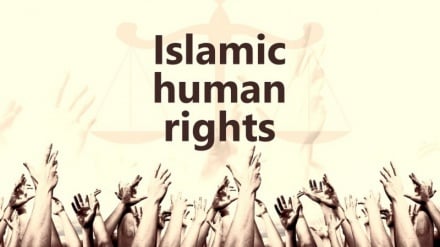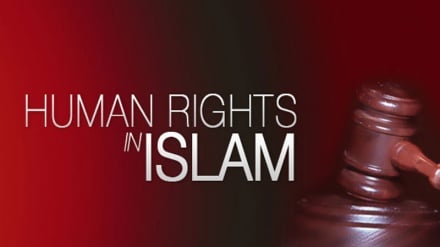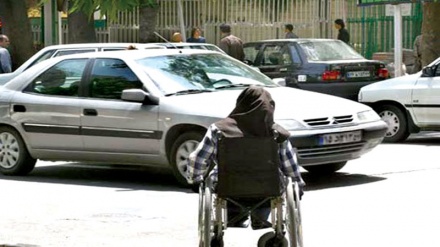Islamic Human Rights (43)
Today, we become familiar with the rights of the defendant in Islamic Human Rights.
Last week, we studied the general guarantees that law provides in support for the rights and freedom of members of the community. One of these guarantees was the rule of law and presence of a well-qualified judicial system within the community. The courts are duty-bound to present lawsuits in accordance to rules and regulations, and to issue rulings and verdicts based on justice. Given that today the concept of security and freedom, administration of justice, and compliance with the rights of individuals is of paramount importance within the world; global measures for maintenance of these affairs have been emphasized via approval of several declarations and conventions to fulfill the rights and freedom of the defendants and to oblige governments to accept and implement these rights and freedoms.
The Islamic judicial system which has been based on maintenance of human dignity, as an independent judicial system alongside other judicial systems, secures a number of principles that fully secure the rights of the defendant. Upon reference to Quranic instructions, one realizes that God Almighty introduces the goal behind sending prophets as administration of justice. Meanwhile, administration of justice toward the defendants is only materialized via maintenance of their judicial security in different phases of the trial. In addition to the said general principle, the correctness of this claim is proved via reference to Islamic sources, and the judicial tradition of the Infallible Imams of the Prophet of Islam’s Household; some of which clearly put emphasis on the rights of the defendant.
One of the most important guarantees of the rights of defendant is the notification of the charges leveled against him. Upon the notification of charges, the defendant becomes aware of the charges leveled against him so that he would be able to alertly defend himself.
This is an essential right of the defendant because he becomes aware of the charges leveled against him and this awareness raises an opportunity for him to prepare all the necessary means to defend himself; and to reject the related charges. The notification of charges sets the stage for continuation of the trial, and the defendant would be able to defend himself only by fully knowing what he has the right to know.
One of the other rights of the defendant is his right to remain silent. The right to remain silent is based on the principles of freedom of speech and innocence of the defendant in relation to questions which the judge asks.
In Islamic rights, the right of the defendant to remain silent is observed with consideration and study of the rules and regulations related to the trial. Whenever the claimant presents the lawsuit, the defendant can react to the accusation via confession to, or denial of the accusation, or by remaining silent.
The principle of innocence of the defendant in Islamic system is today approved as a common legacy of law in all of the world’s progressive nations, and has been attended within the laws of countries, and within the international system. According to the 1st Clause of Article 11 of the Universal Declaration of Human Rights, anyone who is accused of an offense is considered innocent until his offense has been proved by law within the process of a lawsuit; within which all of the defendant’s rights have been secured. Also, according to the 2nd clause of Article 6 of the European Convention of Human Rights, anyone who is accused of an offense maintains the right to be assumed innocent until his charge is proved in accordance to law. The 19th Article of the Islamic Declaration of Human Rights also states that the defendant remains innocent until his offense has been proved in a just trial, which fully guarantees his rights.
The defendant also maintains the right to have an attorney. Hence, presence of the attorney in the trial should be secured. Whenever an individual is accused of an offense, he may lose some of his personal rights due to his lack of awareness of the rights which have been granted to the defendant. Thus, in order to prevent the violation of the defendant’s rights and to provide the judicial security of a just trial, the cooperation of someone who is aware of the rules and regulations can play a constructive role.
In Islamic rules and regulations, the principle of illegitimacy of temporary detention is perfectly clear based on theological reasons. This is because in the divine religion of Islam, any ruling which would deny the freedom of individuals for no reason has not been set. Meanwhile, the only exception to this principle is when the defendant is accused of murder.
One of the other rights of the defendant is to hold an open trial, which means that the members of the community would be able to freely attend the court hearings and to personally observe the trial, becoming assured of administration of justice and impartiality of the judges. Establishment of an open trial secures judicial security. This is because an open trial exposes the performance and decision of the judge to public opinion. This leads the judge to maintain impartiality and the rights of individuals, and to try to carry out a just trial.
In Islamic Sharia, no obligation has been clearly stated for holding open trials. However, upon consideration of the judicial tradition of the Prophet of Islam’s Infallible Household, we realize that many of the trials administered and judged by them were convened in the presence of people.
MR/ME


